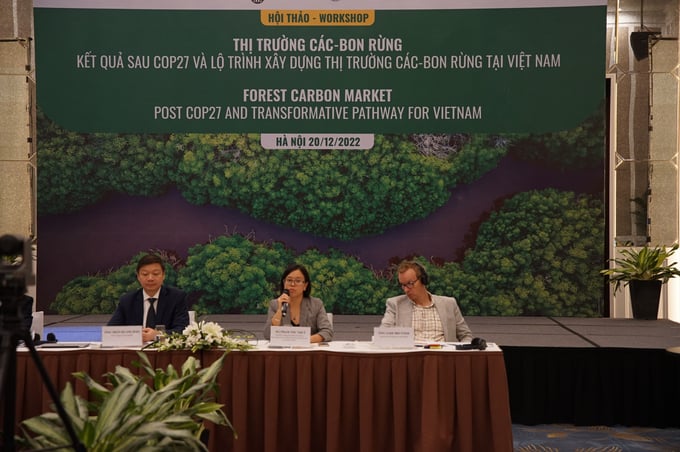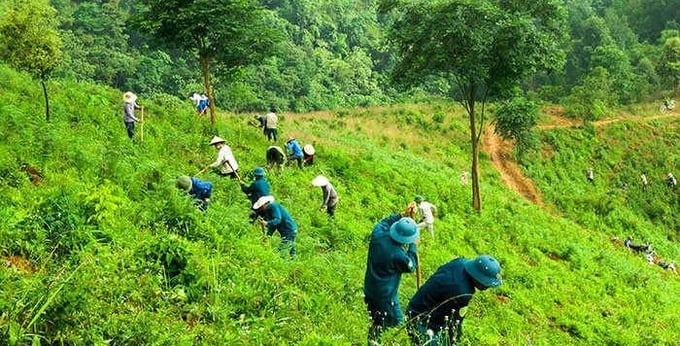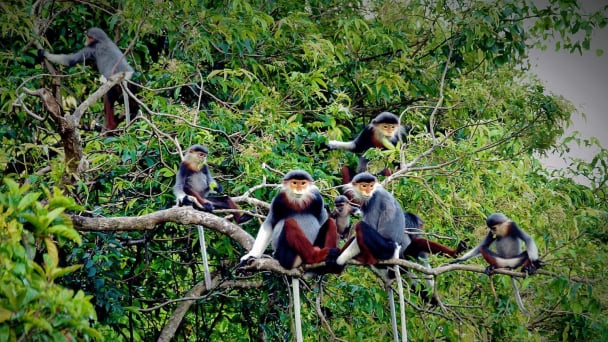May 17, 2025 | 19:33 GMT +7
May 17, 2025 | 19:33 GMT +7
Hotline: 0913.378.918
May 17, 2025 | 19:33 GMT +7
Hotline: 0913.378.918
At the recent workshop "Forest Carbon Market: Post COP27 and Transformative Pathway," academics and professionals paid close attention to carbon property rights, carbon exchange mechanisms, and regulations as they related to the transformative pathway of the carbon market in Vietnam.
In order to fulfill its obligations under the Paris Agreement, COP26, and COP27, the Government of Vietnam has set enhancing carbon sequestration from forests and emissions-reducing actions as one of its top priorities. More than 10 million hectares of Vietnam's 14.7 million hectares of forested land, or 42% of its total land area, are natural forests. The area has a lot of promise and a lot of things you can do to help Vietnam's efforts to cut emissions and boost carbon sequestration.
Vietnam has published Decree No. 06/2022/ND-CP of the Government on Regulations on Mitigating Greenhouse Gas Emissions and Protecting the Ozone Layer, which includes a road map for purchasing, selling, and transferring carbon credits, in order to uphold its international commitments. As a result, Vietnam will develop a mandatory market by 2027 that includes systems for buying, selling, exchanging, and transferring carbon credits as well as quotas for businesses that cut emissions.

Mr. Tran Quang Bao, Deputy Director General, MARD's Vietnam Administration of Forestry (left) and Ms. Pham Thu Thuy, a senior scientist who leads the Climate Change, Energy and Low-Carbon Development team at CIFOR-ICRAF joined the workshop.
The forestry industry has engaged with international organizations and relevant partners to set up pilot initiatives to transmit carbon market outcomes in a manner similar to the mandatory carbon market. More specifically, with the help of the World Bank, the Forest Carbon Partnership Facility signed an Emissions Reduction Purchase Agreement for USD 51.5 million for the Northern Central regions, assuming Vietnam honors its pledge to cut CO2 emissions by 10.3 million tonnes between 2018 and 2024.
A Letter of Intent on the transfer of CO2 to minimize emissions from forests in the Southern Central and Central Highlands was also signed by MARD and inter-organization LEAF/Emergent.
The unit is talking with SK Forestry Company to examine the acquisition of forestation and forestry recovery outcomes in the Northern mountainous areas, according to Mr. Tran Quang Bao, Deputy Director General, MARD's Vietnam Administration of Forestry. MARD is creating a legislative framework to allow local governments and forest owners to take the initiative in creating their own initiatives and engaging in carbon purchase negotiations.
The forestry industry has suggested the amending of Decree 156/2018/ND-CP, which establishes restrictions on purchasing and selling operations, project development, evaluation, and approval, as well as measurement, testing, and report form, be amended. These legal frameworks are crucial for the development of a market for forest carbon.
Senior scientist Ms. Pham Thu Thuy, who oversees the CIFOR-ICRAF team working on climate change, energy, and low-carbon development, claimed that many foreign businesses and organizations came to Vietnam in the wake of COP26 and COP27 with the intention of making investments in the country's carbon market. They are worried, nevertheless, about the absence of a legal pathway for these operations.

Vietnam intends to cut its overall greenhouse gas emissions by 43.5% by 2030 with assistance from other countries, according to the latest Nationally Determined Contribution (NDC) report for 2022.
Vietnam intends to cut its overall greenhouse gas emissions by 43.5% by 2030 with assistance from other countries, according to the latest Nationally Determined Contribution (NDC) report for 2022. The voluntary, unconditional contribution in NDC 2022 has decreased by an extra 62.4 million tons of CO2 equivalent in comparison to NDC 2020. With the conditional contribution, NDC 2022 achieves a further reduction rate of 16.5% and 153.0 million tons of CO2 equivalent.
In order to reach the goal, Mr. Nguyen Van Minh, Head of Climate Change Economics and Information Department, Department of Climate Change (MONRE), reaffirmed that forests and forest carbon sequestration are crucial.
"MONRE received several requests from various areas in the prior time frame to explore whether to sell carbon credits from forests. The Ministry has consistently backed participation in the system for exchanging carbon credits and in efforts to maintain and promote forests, but it must take responsibility for its contribution to the NDC objective. Before considering the carbon trade, it is essential to make sure the objective of contributing to the NDC is met, "Mr. Minh stated.
Ms. Thuy provided more details, citing the three nations with the greatest forest areas—Indonesia, Peru, and Brazil—that have not yet entered the global market and urged them to seriously consider implementing the NDC. "They analyze how domestic firms must be prioritized to cut emissions before exporting overseas in order to secure the entire economic development, in addition to satisfying the NDC and ensuring competitiveness in the international market," a CIFOR representative said.
According to Ms. Thuy, the growth of the carbon market would be driven by both government regulations and market segmentation. When creating a carbon market, it's important to consider where there are vacancies in the market and where there is the rivalry with other nations. Buyers are seeking these two features in the high-quality market sector, with a focus on biodiversity and social protection.
"Investors assert that there is money available, but there isn't enough of it since certain nations can't comply with demands like social safeguards or biodiversity protection. In contrast to other nations, Vietnam has the benefit of being one of those with a high percentage of biodiversity. Vietnam, therefore, competes directly in the high-quality market segment," Ms. Thuy added.
Translated by Linh Linh

(VAN) The United Nations designated 22 May as the International Day for Biodiversity 2025 with the theme 'Harmony with nature and sustainable development.'
![Multi-channel, multi-directional Vietnamese agricultural markets: [8] A national strategy is needed](https://t.ex-cdn.com/nongnghiepmoitruong.vn/608w/files/phucpm/2025/05/15/1435-thi-truong-nong-san-viet-da-kenh-da-huongbai-8-can-mot-chien-luoc-quoc-gia-084750_728.jpg)
(VAN) The Chairman of Hung Nhon Group shared: ‘Opening up and tapping into new markets is the right and strategic direction for Vietnam's agricultural sector.’

(VAN) Food waste has become a serious issue in modern society, especially in rapidly urbanizing and developing cities like Hanoi.
![Multi-channel, multi-directional Vietnamese agricultural markets: [7] Deep processing makes global reach easy](https://t.ex-cdn.com/nongnghiepmoitruong.vn/608w/files/huytd/2025/05/16/2946-che-bien-sau-chia-khoa-vang-nang-tam-nong-san-viet-tren-ban-do-the-gioi-080603_110-093858.jpg)
(VAN) The application of deep processing technology is helping Vietnamese agricultural products enhance their value, create competitive advantages, and open doors to conquer global consumers.
![Multi-channel, multi-directional Vietnamese agricultural markets: [6] Agri products go online](https://t.ex-cdn.com/nongnghiepmoitruong.vn/608w/files/content/2024/12/10/1-113313_954.jpg)
(VAN) Bringing agri products onto e-commerce platforms is an effective way to build a brand that many businesses, cooperatives, and agricultural production households are doing.

(VAN) Veterinary training should focus on quality, not just quantity. Veterinarians also need more options to pursue specialized training.

(VAN) The veterinary industry needs to be viewed objectively and further invested in to properly demonstrate its role and importance in the new context.